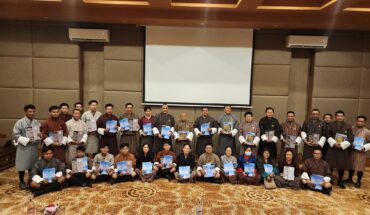
DAWA ZANGMO
Thimphu
In a decisive move to bolster country’s agricultural sector and rural economy, the Ministry of Agriculture and Livestock (MoAL) tabled the Cooperatives and Farmer Groups Bill of Bhutan 2025.
The bill, tabled on 26 May in the ongoing National Assembly session, is expected to modernize, regulate, and empower grassroots collectives across the country.
The new Bill aims to replace the outdated Co-operatives (Amendment) Act of 2009, which officials and stakeholders argue has failed to meet the evolving needs of Bhutan’s cooperative sector.
With the number of registered farmer groups and cooperatives expanding over the past decade, but their impact limited by weak regulatory support, the revised legislation seeks to correct long-standing inefficiencies and pave the way for sustainable community-based economic development.
“This Bill is not just a policy update—it is a strategic shift toward greater economic self-reliance for farmers and rural communities,” said MoAL minister Younten Phuntsho, while introducing the bill as the lead agency behind the legislation.
Lyonpo announced that the ministry is now concentrating on finalizing the required documents and securing funding to launch the scheme. At the dzongkhag level, livestock and agricultural officers, together with extension workers, will lead efforts to raise awareness and promote the initiative.
The agriculture minister added that with the changing climate, farmers have been heavily affected by pest issues, diseases, unpredictable weather, and various natural disasters.
“Through the Royal Kidu program, farmers receive compensation in many cases. This new government-backed insurance will provide formal support to these royal relief efforts,” Lhakpa Tshering Tamang, MP for Sergithang-Tsirang Toed said, expressing support for the initiative but urged the government to offer substantial subsidies to ensure the scheme is affordable for all farmers.
The roots of the reform trace back to 2001, when the original Co-operatives Act of Bhutan was passed but never implemented. In 2009, a modest amendment shifted oversight of cooperatives from the Ministry of Home and Cultural Affairs to MoAL.
It also introduced the concept of Farmer Groups alongside cooperatives, though without a legal framework to support either.
As of this year, the Department of Agricultural Marketing and Co-operatives (DAMC), under MoAF, has registered 719 farmer groups, 120 cooperatives, and two federations. Despite this numerical growth, many of these groups remain weak, loosely regulated, and financially unsustainable.
“The Act mandated annual audits by certified auditors, but most groups can’t afford them,” said a cooperative leader in Sarpang. “This legal requirement has remained on paper, contributing to poor financial practices.”
The lack of differentiation in governance structures between cooperatives and farmer groups, insufficient legal avenues for resource mobilization, and the overreliance on court proceedings to dissolve failing groups have added to the dysfunction.
The Bill establishes clear legal criteria for the formation, registration, and functioning of farmer groups and cooperatives—recognizing their differing operational models. This will resolve ambiguity and improve administrative efficiency.
The authority to register and regulate groups will be delegated to regional or field offices, allowing for quicker approvals and more localized oversight.
Instead of mandating expensive certified audits, the Bill proposes that internal auditors from Dzongkhags (districts) handle smaller groups, while federations and unions may be reviewed by empaneled auditors.
This move is expected to drastically cut compliance costs while still upholding transparency.
The bill introduces a new administrative mechanism to dissolve non-compliant or defunct groups, eliminating the need for lengthy and costly court proceedings.
For the first time, the law will empower authorities to impose penal or pecuniary sanctions for violations, including misuse of funds or non-compliance with rules—closing a long-standing enforcement loophole.
The bill also establishes regional dispute resolution committees to address grievances quickly and locally, reducing the burden on the national judiciary.
These changes are expected to make farmer groups and cooperatives more resilient, transparent, and accountable—attributes essential for attracting donor funding, building trust among members, and scaling up rural economic activity.
On the contrary to what sweeping reform might suggest, the bill is not expected to place additional financial burdens on the government. Since no new agencies will be created and existing institutions will be utilized, the recurring cost is negligible.
However, a modest one-time budget of Nu 3.35 million has been proposed for three essential activities of drafting the rules and regulations (Nu 0.30 million), printing the Act and related materials (Nu 0.05 million) and holding consultation meetings with stakeholders (Nu 3.00 million).
One of the most detailed aspects of the reform lies in the delegated legislation, or the rules and regulations that will support the Act’s implementation.
These include procedures for registration and name changes of groups, up gradation of Farmer Groups to Cooperatives, election of Boards and Committees, investment and fund utilization guidelines, dispute settlement frameworks with specified timelines, and composition and responsibilities of advisory committees and registrars.
By articulating clear rules and institutional responsibilities, the delegated legislation is expected to prevent the ambiguity and lax enforcement that plagued the 2009 Act.
The advisory committee, envisioned in the new rules, will include representatives from relevant ministries, agencies, and civil society organizations. Their role will be to guide cooperative development, possibly extending beyond the agriculture sector into crafts, rural tourism, and small-scale manufacturing.
Among Bhutan’s farming communities, the response has been cautiously optimistic. For many, especially in remote areas, forming cooperatives or farmer groups has been a way to access markets, pool resources, and negotiate better prices.
Yet, many groups have faltered due to poor governance, lack of funding, and legal uncertainty.
“We had no training, no legal advice, and no one checked our accounts for years,” said Kinley, a member of a defunct farmer group in Trashigang. “This new law gives us a second chance—but only if it’s properly implemented.”
Experts echo this sentiment. While the Bill offers a robust framework, success will depend on training officials, educating farmers, and investing in digital tools for monitoring and reporting.
“Laws are only as effective as their implementation,” said a legal scholar at the Royal Institute of Management. “This Bill is a major step forward, but capacity-building must follow quickly.”
As the National Assembly prepares to deliberate the Bill, expectations are high that it will receive bipartisan support. Stakeholders across government, civil society, and the private sector agree that without strong, accountable cooperatives and farmer groups, Bhutan’s development goals risk remaining out of reach.
If passed, the Bill could become a cornerstone of Bhutan’s rural development strategy—making the cooperative movement not just a policy artifact, but a living engine of inclusive growth.





